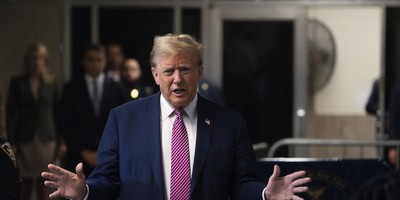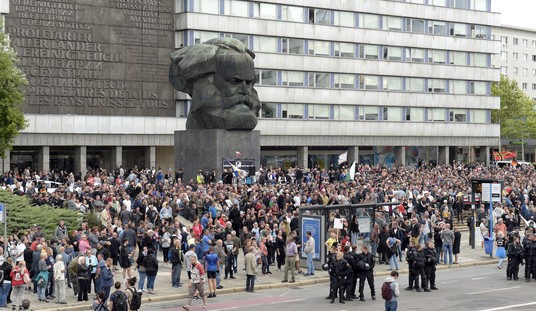If President Obama really means to wreck the U.S. economy (as many influential conservatives stridently insist) then why didn’t he finish the job when he had the chance—in September, 2008? The argument for Obama’s ruinous intentions can’t account for his unequivocal endorsement of the Bush financial rescue plan just two months before the presidential election.
According to those who believe that deliberate devastation represents the prime item on the presidential agenda, Barack Obama is a liberty-hating radical who wants to replace our free market system with a socialist dictatorship or, at best, a French-style welfare state. The president’s most suspicious detractors argue that the only way he can realize his Marxist dreams involves engineering the collapse of our free market system and then imposing a government-controlled economy more to his liking. This logic concludes that in order to cement his hold on power, he’ll eventually make the people so destitute and desperate that they will turn to federal protection in a state of utter dependence.

The most obvious rebuttal to these paranoid delusions concerns the re-election imperative. Barack Obama must face the electorate in just two and a half years, and presidents who preside over financial collapse or national hardship win scant support for “four more years.” With this in mind, it’s hard to imagine the president going to bed at night, praying the unemployment rate will rise the next day, or that the Dow Jones average will go down. Presidents yearn for positive economic outcomes not because they’re selfless humanitarians but because, like all politicians, they possess a well-developed instinct for self-preservation. If the economy crashes under Obama’s watch the public would be more likely to blame Obamunism rather than capitalism, and to throw out the Democrats before they threw out the free market system.
Recommended
If Barack Obama yearned for a financial catastrophe he could have gotten his wish with ease and with no risk of blame had he responded differently to the Wall Street crisis of the Fall of 2008. My long-time producer, Jeremy Steiner (“The Pride of Hillsdale College”) makes the brilliant point that the definitive answer to claims of Obama’s bad intentions centers on his behavior when faced with the banking meltdown 18 months ago. With most of the major financial players (particularly AIG) on the point of bankruptcy, and President Bush struggling mightily to win Congressional approval for his $700 billion TARP bailout package, candidate Obama provided decisive support. Had he taken the opposite position – raising his voice as the Democratic presidential nominee to block the federal rescue of the banking system – there’s no chance The Troubled Asset Relief Program could have won approval in the House. The rescue package remained deeply unpopular in the nation at large, and the majority of House Republicans voted against it twice. Only overwhelming Democratic support (Pelosi and her colleagues backed the plan, 172 to 63) insured its passage and, as the widely admired Presidential nominee of his party, Senator Obama easily could have shifted that support and doomed the bailout.
In other words, those who believe that Obama intends to wreck capitalism must somehow explain the inconvenient fact that he passed up a golden opportunity to do just that two months before his election.
Some skeptics still insist that providing the TARP money actually did more damage than good to the financial system, and thereby can explain Obama’s support for the rescue as still somehow reflecting his hatred of the free market. But that line of reasoning rests on arguments about the economy’s long-term health, not its immediate performance in the months before the election. No economic analyst doubts that a final defeat of the Bush bailout would have produced a devastating wave of major failures in the financial world and a near total freeze of the banking system. When the House of Representatives narrowly turned down the TARP proposal in its first vote on September 29th, Wall Street responded the next day with the greatest one-time loss in Dow Jones history --- plummeting a gut-wrenching, unprecedented 777 points. That experience helped persuade additional Democrats, and 91 of 199 Republicans, to go along with both presidential candidates and to approve the package.
And what if Obama had split with McCain and Bush, aligning himself with overwhelming public opposition to the bailout, and blocking its approval in Congress? When the market collapsed and companies went under, there’s no chance the public would have blamed the candidate criticizing Bush and Paulson more than they blamed the candidate (McCain) who backed them. In fact, populist opposition to TARP, combined with the resulting financial catastrophe, would have produced an even greater margin of victory for Obama and the Democrats. Instead of winning by 7 percentage points, the Democratic nominee could have easily won by an historic landslide of 20 points or more.
If Obama really wanted the wreckage of capitalism and its replacement and restructuring with socialism, he could have achieved that goal with surprising ease following market devastation and a crushing victory. With Wall Street in ruins, the new president could have inspired the nation by taking federal control of the shattered economy. Bush would have been blamed for the horrible scale of the suffering and the new leader would get credit for even the most modest change.
Politically, it made no sense for Barack Obama to join Bush, McCain and the Wall Street establishment in backing TARP. His resolute support for his partisan rivals makes no sense at all without the sane, obvious assumption that Obama (like most politicians of both left and right) actually wants the best for the country, its economy and its citizens.
And if he wanted to protect the financial well-being of the Republic while Bush still presided in the White House, why would he suddenly reverse himself and want to ruin the nation when he occupied the Oval Office? How could even the most paranoid conspiracy theorists suggest that Obama wanted to defend the economy during the last days of the Bush regime, but somehow wanted to damage it once he took over and would receive the bulk of the blame?
Recalling candidate Obama’s support for the rescue package in September of ’08 doesn’t prove that he made the right decision then, or that he’s followed productive policies since assuming the presidency some four months later. On my radio show and elsewhere, I’ve expressed my fervent opposition to the president’s devastating and incompetent economic policies, featuring reckless spending, insane deficits, wasteful stimulus spending, relentless governmental expansion, catastrophic tax increases, chilling cap-and-trade and, worst of all, a wretchedly misguided health care takeover.
These initiatives may well result in undermining the prosperity of the United States, even though there’s scant reason to believe that this ruination represents Obama’s ultimate intention. But the irrational insistence that the president deliberately desires to inflict economic pain, thereby undermining his own popularity and electoral prospects, makes so little sense that it will render conservatives less effective in opposition, not more so. We stand a better chance of defeating Obama’s schemes, and restoring the free market system, if we resist his policies as sincerely but disastrously misguided, not willfully and suicidally destructive.

























Join the conversation as a VIP Member